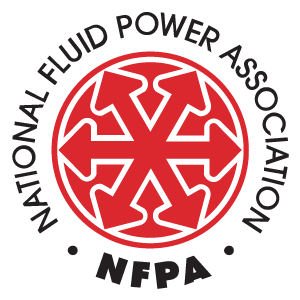
By Eric Lanke
NFPA President/CEO
I recently attended the June 2019 Summit of the Center for Compact and Efficient Fluid Power (CCEFP) at Purdue University. This was the second of two meetings in our last fiscal year where the fluid power research projects supported by our new NFPA Research Supplement Program were presented.
In our efforts to increase the number of university students educated in fluid power, the NFPA Education and Technology Foundation provided ten $10,000 research supplements to ten academic faculty members working on fluid power research at six universities. This helps to engage current and build the careers of future university faculty who are and will be in a position to teach fluid power to undergraduate engineers on their campuses. The research supplements provide travel support so that each faculty member and one of their graduate students can attend to present their research at designated industry conferences and research summits like the one hosted by the CCEFP.
One such faculty member is Professor Paul Michael at the Milwaukee School of Engineering, who presented on his project, “Polymer-Enhanced Fluid Effects on Mechanical Efficiency of Hydraulic Pumps,” at the CCEFP Summit. The goal here is to bridge the gap between fundamental behavior of polymer-enhanced fluids and the efficiency of fluid power systems. Essentially, Michael and his team (which includes Professor Ashlie Martini and several students at the University of California at Merced), are trying to determine what effect polymer viscosity modifiers, or VMs, have on energy losses in fluid power systems. Does lowering the viscosity of the base oil affect the energy efficiency of the system?
Their initial results seem to indicate that it does not, although because they are trying to match molecular simulations to actual results they get from a dynamometer, they have so far only used polymers that are smaller than those used in most commercial applications. As I understand it, it was a bit of a trade-off, as the smaller molecules are not susceptible to shear, which might mask the impact on efficiency, but the larger molecules are difficult to simulate in computer models. As the project moves forward, the team plans to more closely study the effect of shear on the molecules to see if they can better parse out the potential impact on system efficiency.
A copy of Michael’s presentation slides can be accessed here.
Collectively, the research projects supported by NFPA Research Supplements represent more than $4.9 million in funding from a variety of organizations, including the U.S. Department of Energy, the National Science Foundation, and the Center for Compact and Efficient Fluid Power (CCEFP). They are an excellent sample of the growing body of fluid power research being funded by the federal government and other research organizations.
Like this post? Share it!
Recent Posts
All You Want to Know About AI and Its Applications for Your Organization
By Mike MarksIndian River Consulting Group Buzz, hype, mania — we’re surrounded by the topic of AI. The use of generative artificial intelligence tools has exploded since the launch of ChatGPT in late 2022. These tools range from writing to voice, art and video generators. Enterprising companies are creating tools to service industry niches with…
NAM Regulatory Update: Manufacturer to Congress | Support the American Dream
As part of an effort to bring more information about the regulatory and legal environment facing American manufacturers, NFPA is monitoring the newsfeed of the National Association of Manufacturers (NAM) and will be bringing important updates like this to the attention of NFPA members. As mentioned in this article, Husco is a long time NFPA…
NFPA Welcomes New Member: Firestone Airide
Firestone Airide, a division of Firestone Industrial Products headquartered in Nashville, Tennessee, drives innovative technology designed to eliminate vibration in global transportation. Firestone has over 80 years of experience designing and manufacturing air springs and related products to eliminate vibration across the automotive, heavy-duty, and off-highway segments and will collaboratively integrate tire and air spring sensing technologies to create…



